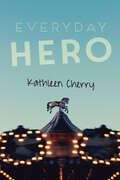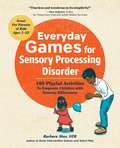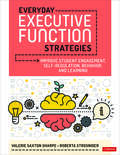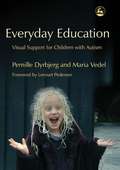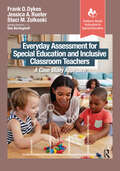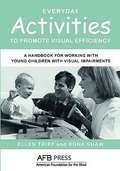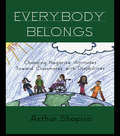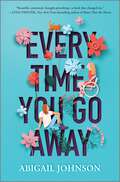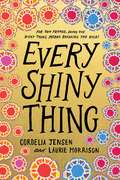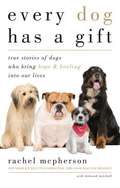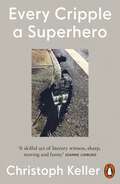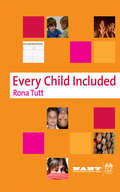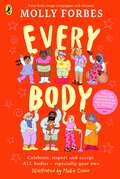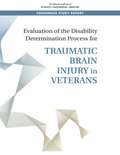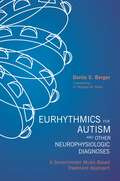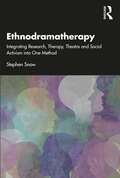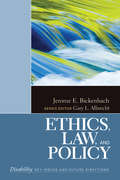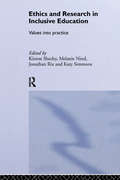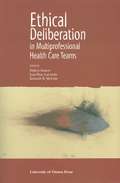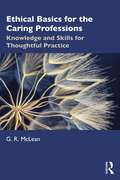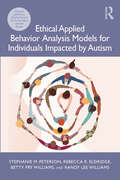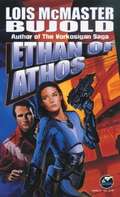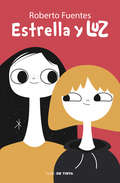- Table View
- List View
Everyday Hero
by Kathleen CherryWhen a new friend challenges Alice, who has Asperger's, to step outside her comfort zone, Alice decides to revise her rules in this novel for middle readers.
Everyday Games for Sensory Processing Disorder: 100 Playful Activities to Empower Children with Sensory Differences
by Barbara SherIn this new solutions-based guide, Barbara Sher has collected 100 sensory-rich games that make joyful working with the children having sensory processing disorder, autism and Asperger's. Everyday Games for Sensory Processing Disorder advocates play as the most effective approach for children with sensory processing disorder, and illustrates the many ways that play can lead to significant breakthroughs.
Everyday Executive Function Strategies: Improve Student Engagement, Self-Regulation, Behavior, and Learning
by Valerie Saxton Sharpe Roberta I. StrosniderEveryday executive function strategies to engage and motivate YOUR students Without a good foundation in executive function skills, many interventions will not be helpful for students experiencing academic and social-emotional challenges. However, explicitly taught metacognitive strategies provide students with the tools to engage and benefit from classroom instruction through the use of an executive function skillset. With an impressive collection of 75 grade-appropriate executive function strategies, this practical guide addresses student needs in areas such as planning, working memory, time management, inhibitory behavior, cognitive flexibility, and self-regulation. Inside, you’ll find the metacognitive strategies shown most effective in facilitating students’ readiness and success in learning, plus Suggestions for incorporating executive function skills into your daily lesson planning and teaching routine without detracting from instructional time A step-by-step manual for explicitly teaching metacognitive skills Grade-level appropriate strategies grouped according to elementary, middle, and high school levels Guidance for adapting strategies to meet a wide range of individual student needs Designed to be applicable to and usable by many educators, from teachers and school psychologists to administrators and school counselors, this toolbox of strategies will help you improve student engagement, self-regulation, behavior, and learning.
Everyday Executive Function Strategies: Improve Student Engagement, Self-Regulation, Behavior, and Learning
by Valerie Saxton Sharpe Roberta I. StrosniderEveryday executive function strategies to engage and motivate YOUR students Without a good foundation in executive function skills, many interventions will not be helpful for students experiencing academic and social-emotional challenges. However, explicitly taught metacognitive strategies provide students with the tools to engage and benefit from classroom instruction through the use of an executive function skillset. With an impressive collection of 75 grade-appropriate executive function strategies, this practical guide addresses student needs in areas such as planning, working memory, time management, inhibitory behavior, cognitive flexibility, and self-regulation. Inside, you’ll find the metacognitive strategies shown most effective in facilitating students’ readiness and success in learning, plus Suggestions for incorporating executive function skills into your daily lesson planning and teaching routine without detracting from instructional time A step-by-step manual for explicitly teaching metacognitive skills Grade-level appropriate strategies grouped according to elementary, middle, and high school levels Guidance for adapting strategies to meet a wide range of individual student needs Designed to be applicable to and usable by many educators, from teachers and school psychologists to administrators and school counselors, this toolbox of strategies will help you improve student engagement, self-regulation, behavior, and learning.
Everyday Education: Visual Support for Children with Autism
by Maria Vedel Pernille DyrbjergVisual support aids can be highly effective tools for increasing levels of communication and independence in children with autism, who often have difficulty interpreting spoken language and non-verbal facial expressions. Fully illustrated with inspiring examples, Everyday Education provides a wealth of ideas for creating visual support aids for children on the autism spectrum. Photographs and clear, practical explanations describe how these tools can be arranged helpfully around the home for the child to use. The authors describe how visual support aids can be used in all kinds of everyday situations, from labelling - for example, sticking a picture of a dinner plate with a knife and fork to the chair in which the child sits at meal times - to putting together a pictorial activities schedule for the child to refer to. This fun and encouraging book will be a valuable source of ideas for parents of children with autism and professionals working with them.
Everyday Assessment for Special Education and Inclusive Classroom Teachers: A Case Study Approach (Evidence-Based Instruction in Special Education)
by Frank Dykes Jessica Rueter Staci ZolkoskiEveryday Assessment for Special Education and Inclusive Classroom Teachers: A Case Study Approach provides a foundation in practical research-based methods to help today’s teachers tailor their instruction to meet the needs of all learners.With an easy-to-understand format, Everyday Assessment for Special Education and Inclusive Classroom Teachers combines real-life case studies with practitioner-friendly wording to teach and describe assessment topics in a concise manner. Practical applications for use in classroom settings can also be found throughout the text.What’s included in Everyday Assessment for Special Education and Inclusive Classroom Teachers: Example progress monitoring charts Curriculum-based assessments, behavior charts, and norm-referenced assessments to guide the reader when extracting data and inform everyday teaching practices Activities to practice skills and self-reflect on learning objectives at the end of each chapter Everyday Assessment for Special Education and Inclusive Classroom Teachers: A Case Study Approach pairs rationale and research with real-life case studies and applications for practice to prepare pre-service teachers to meet the unique needs of every learner.
Everyday Activities to Promote Visual Efficiency: A Handbook for Working with Young Children with Visual Impairments
by Rona Shaw Ellen TriefEarly intervention services are essential for infants and toddlers who are visually impaired and have some functional vision that they will be able to use for everyday activities--not only to ensure their early development but also to help them learn to use their vision with maximum effectiveness, right from the start. Everyday Activities to Promote Visual Efficiency offers guiding principles for early intervention with very young children who are visually impaired and who may also have additional disabilities. This important new resource provides simple activities that can be incorporated easily by families and service providers into the everyday routines of a baby or child to facilitate early visual development and use of functional vision.
Everybody Belongs: Changing Negative Attitudes Toward Classmates with Disabilities (Critical Education Practice #Vol. 14)
by Arthur ShapiroThe evil prosthesis of Captain Hook, the comical speech of Porky Pig, and the bumbling antics of Mr. Magoo are all examples of images in our culture which can become the basis of negative attitudes and subliminal prejudice towards persons with disabilities. These attitudes influence and underlie discriminatory acts, resulting in negative treatment and segregation. A teacher's ability to recognize and counter such images may well determine the success of inclusion and mainstreaming programs in our schools and society. Well-researched and well-written, this book offers practical guidance as grounded in solid research to schools that are wrestling with how to mainstream children with disabilities.
Every Time You Go Away
by Abigail JohnsonPerfect for fans of Jennifer Niven, Abigail Johnson draws a searing and lyrical portrait of grief, forgiveness, and the kind of love that blooms in the aftermath. <P><P> Eight years ago, Ethan and Rebecca met, two troublemaking kids sharing secrets and first kisses in a tree house, until Ethan’s mom returned to take him away. Each and every visit, his only goodbye was a flower on Rebecca’s windowsill. <P><P> Four years ago, Ethan left for the last time to take care of his mother, who has struggled with addiction his whole life. <P><P> Two years ago, Rebecca was in a car accident that killed her father. She’s been learning to navigate life as a wheelchair user ever since. Now, they discover if their hardships have torn them apart…or will bring them closer than ever.
Every Teacher's Little Book of Wisdom
by Bob Algozzine Kate AlgozzineThis wee book is full of inspiring ideas, and good pointers on how to be the best teacher you can be. Written by two noted Special Educators these pointers apply to any teacher from Nursery school to a Ph.D. adviser. Worth the look if you are or want to be a teacher. "People with disabilities are just like everybody else. They have dreams, goals, and aspirations just like their neighbors and peers. When they are children, they deserve the same educational experiences as their neighbors and peers: Good teachers who hold high expectations for success; good teachers who know how to manage classrooms to maximize learning opportunities for all students; and, good teachers who teach them to read, to do mathematics, or to do anything else they need or want to learn. Nothing about having a disability limits an individual's desire to learn. Nothing about having a disability should limit the willingness of a teacher to teach. Good teaching is good teaching and there are no boundaries on where it can occur and who will profit from it. We believe this and try to make it happen whenever we teach. Now it is up to you."
Every Shiny Thing
by Cordelia Jensen Laurie MorrisonIn this beautifully constructed middle-grade novel, told half in prose and half in verse, Lauren prides herself on being a good sister, and Sierra is used to taking care of her mom. When Lauren’s parents send her brother to a therapeutic boarding school for teens on the autism spectrum and Sierra moves to a foster home in Lauren’s wealthy neighborhood, both girls are lost until they find a deep bond with each other. But when Lauren recruits Sierra to help with a Robin Hood scheme to raise money for autistic kids who don’t have her family’s resources, Sierra has a lot to lose if the plan goes wrong. Lauren must learn that having good intentions isn’t all that matters when you battle injustice, and Sierra needs to realize that sometimes, the person you need to take care of is yourself.
Every Dog Has a Gift
by Rachel McphersonInspiring stories of dogs who do good. Anyone who has ever had a relationship with a dog will tell you: They want nothing more than to give love and be loved in return. In Every Dog Has a Gift, Rachel McPherson draws on her experience as the founder and executive director of The Good Dog Foundation, the largest animal-assisted therapy organization on the East Coast, to share the amazing stories of dogs that bring hope and healing into our lives. Much has been said about the heroic roles dogs played following September 11th and Hurricane Katrina in providing support and comfort for the families and victims of these terrible tragedies, but the truth is that millions of dogs around the world are heroes every day. These therapy and service dogs (and often quite ordinary, "uncertified" dogs just like your own!) can: *serve as the perfect audience for kids who need help with practicing and improving their reading skills; *hold troubled families together; *provide a calm and centering presence for autistic children, and *help individuals who have lost the ability to walk to more easily navigate the world. Every Dog Has a Giftis a celebration of the gift that each and every dog possesses: the ability to bring the healing power of unconditional love into our lives.
Every Cripple a Superhero
by Christoph Keller'Fascinating ... compelling ... very funny' Sunday Times'A defiant call to arms ... affecting ... lingers long in the memory after its final page' Morning Star'A skilful act of literary witness, sharp, moving and funny' Joanne Limburg 'Christoph Keller ... ranks among the great Swiss writers' Neue Zürcher ZeitungMost stories of disability follow a familiar pattern: Life Before Accident. Life After Accident. For Christoph Keller, it was different: his childhood diagnosis with a form of Spinal Muscular Atrophy only revealed what had been with him since birth. SMA III, the 'kindest one', allows those who have it to live a long life, and it progresses slowly. There is no cure. By the age of 25, he had to use a wheelchair some of the time. 'There were two of me: Walking Me. Rolling Me.' By 32, he could still walk into a restaurant with a cane or on somebody's arm. At 45, 'Rolling Me' took over altogether.Intimate, absurdist and winningly frank, Every Cripple a Superhero is at once a memoir of life with a progressive disorder, and a profound exploration of the challenges of loving, being loved, and living a public life - navigating restaurants, aeroplanes, museums and artists' retreats - in a world not designed for you. Threaded throughout are Keller's own photographs of the unexpected beauty found in puddle-filled 'curb cuts', the pavement ramps that, left to disintegrate, form part of the urban obstacle course. Those puddles become portals into a different, truer city; and, as they do, so this book - told with humour and immense grace - begins to uncover a truer world: one where the 'normal' is not normal, where disability is far more widespread than we might think, and where there always exist, just alongside our own, the lives of everyday superheroes.
Every Child Included
by Dr Rona Tutt`This is an extremely timely book, which would be a very useful addition to any staffroom library' - Special `One of the most detailed overviews on what is really happening with inclusion at ground level. In years to come, professionals will remember they used Rona Tutt's book for identifying where good practice was really happening. Along with Rita Cheminais and Anne Hayward, this must rate as one of the most useful texts of the decade' - Tricia Barthorpe, Past President of the National Association of Special Educational Needs, (NASEN) How can your school or setting become part of a truly inclusive education service that provides for all children and young people? Looking at the Every Child Matters agenda and the government's strategy for special educational needs (SEN), this book moves beyond the debate about specialist provision to explore the exciting developments that are taking place in both mainstream and special schools, as they join forces to provide for pupils with increasingly complex needs. It provides examples of innovative ways forward that will help all schools develop their own strategies to support those pupils who find it hardest to learn. Topics covered include: o successful strategies for supporting pupils in mainstream schools o the benefits of co-located schools, federations and partnerships o the developing role of day and residential special schools o the changing nature of support and advisory services The book is essential reading for school leaders and senior management teams, and will be of interest to governors, policy makers and all those involved in the training and professional development of the school workforce. Rona Tutt is a Past President of the National Association of Head Teachers (NAHT) and works as an SEN consultant, writer and researcher.
Every Body: Celebrate, respect and accept ALL bodies – especially your own
by Molly ForbesShortlisted for The Teach Primary Awards 2024.We all have a body. They don't always function the same as other people's. And they certainly don't all look the same. But one thing is certain - every body deserves respect. This is an essential guide to embracing and respecting all bodies, for readers aged 9+.Sometimes social media can make us feel like we're not good enough if we don't have a 'perfect' body. But the truth is, everyone feels bad about their bodies sometimes – even celebrities with millions of followers.Author and campaigner Molly Forbes is here to show you that you - and ONLY you - get to decide how you feel about your body. And if we want to change the conversation around body image, we need to advocate for every single body - including those that look or function differently from our own.It's time to stop criticising the way we look, and celebrate all our glorious differences!
Evaluation of the Disability Determination Process for Traumatic Brain Injury in Veterans
by Engineering Medicine National Academies of SciencesThe Veterans Benefits Administration (VBA) provides disability compensation to veterans with a service-connected injury, and to receive disability compensation from the Department of Veterans Affairs (VA), a veteran must submit a claim or have a claim submitted on his or her behalf. Evaluation of the Disability Determination Process for Traumatic Brain Injury in Veterans reviews the process by which the VA assesses impairments resulting from traumatic brain injury for purposes of awarding disability compensation. This report also provides recommendations for legislative or administrative action for improving the adjudication of veterans’ claims seeking entitlement to compensation for all impairments arising from a traumatic brain injury.
Eurhythmics for Autism and Other Neurophysiologic Diagnoses: A Sensorimotor Music-Based Treatment Approach
by Stephen M. Shore Dorita S. BergerIn Eurhythmics for Autism and Other Neurophysiologic Diagnoses, Dorita S. Berger reveals how Eurhythmics, a method of teaching the musical concepts of rhythm, structure and expression kinaesthetically through movement, can help develop sensorimotor skills in children and adults with autism and other special needs. Covering both theory and practice, she explains this innovative, music-based approach and how it can also address cognitive and sensory issues in adults with debilitating conditions, such as dementia or post-traumatic stress disorder. With a particular emphasis on autism, she provides clear and adaptable session plans, suitable for working with children and adults of all ages.
Ethnodramatherapy: Integrating Research, Therapy, Theatre and Social Activism into One Method
by Stephen SnowEthnodramatherapy explores the integration of the performance ethnography method, known as ethnodrama, with the principles and practices of drama therapy to establish a sound theoretical formulation for ethnodramatherapy, and considers its use as art, as therapy, as research and as a vehicle for social justice. The book begins by defining ethnodramatherapy – an original synthesis created by the author through deep study and practice of Mienczakowski’s enthnodrama, combined with 35 years of his own practice and research in drama therapy, creative arts therapies and therapeutic theatre. The book describes the origins of ethnodramatherapy, along with its evolution and method. It then delves into applications of the practice highlighted by five case studies with different audiences in different settings. Subjects include adults with developmental disabilities, female adolescents in youth protection, caregivers for loved ones with mental illnesses and Chinese students exploring controversial issues of oppression in China. Complex ethical issues are reviewed and suggestions are made on how to deal with some of the challenging ethical situations that are likely to arise in the ethnodramatherapy process. What emerges is a powerful tool that harnesses theatrical art, ethnographic research and the clinical techniques of drama therapy to create a potential for emancipatory experience for both performers and audiences. This exciting and dynamic synthesis of drama therapy, performance ethnography, theatrical art and social activism will be of interest to the whole community of theatre practitioners and scholars who use theatre to effect individual and social change, including the disciplines of applied theatre, theatre education, experimental theatre, performance studies, and, of course, drama therapy, psychodrama and the other creative arts therapies.
Ethics, Law, and Policy
by Dr Jerome E. BickenbachThis volume in The SAGE Reference Series on Disability explores ethical, legal, and policy issues of people with disabilities, and is one of eight volumes in the cross-disciplinary and issues-based series, which examines topics central to the lives of individuals with disabilities and their families. With a balance of history, theory, research, and application, specialists set out the findings and implications of research and practice for others whose current or future work involves the care and/or study of those with disabilities, as well as for the disabled themselves. The presentation style (concise and engaging) emphasizes accessibility. Taken individually, each volume sets out the fundamentals of the topic it addresses, accompanied by compiled data and statistics, recommended further readings, a guide to organizations and associations, and other annotated resources, thus providing the ideal introductory platform and gateway for further study. Taken together, the series represents both a survey of major disability issues and a guide to new directions and trends and contemporary resources in the field as a whole.
Ethics and Research in Inclusive Education: Values into practice
by Jonathan Rix Katy Simmons Kieron Sheehy Melanie NindThe recent move towards inclusive education has radically influenced the way educational research is conducted. Students need to become aware of the critical legal and ethical responsibilities that arise from investigation in this new and expanding area. Written from the standpoint of inclusive education, rather than 'special education', this carefully edited collection of readings from a wide variety of sources, will develop the student's ability to: * identify and respond to ethical dilemmas that occur within their particular research methodologies and settings. * respond appropriately to the myriad of complex legal issues that are pertinent to their own workThe contributions to this book draw upon examples of inclusive practices from around the world. Students taking postgraduate courses or diplomas in Inclusive education will find this an invaluable read.
Ethical Deliberation in Multiprofessional Health Care Teams
by Hubert Doucet Jean-Marc Larouche Kenneth R. MelchinThis study analyzes both pragmatic and theoretical perspectives of ethical deliberation, as well as the professional and philosophical backgrounds for the ethical deliberation of social workers, nurses and doctors working in the field of chronic illness. In doing so, this volume expands the scope of current research through an analysis of the process and its dynamics.
Ethical Basics for the Caring Professions: Knowledge and Skills for Thoughtful Practice
by G. R. McLeanThis book trains students of the caring professions, across health and social care, in the basic philosophical skills and knowledge needed to deal with the ethical aspects of their profession. It shows why ethical education is required, and teaches the skills of reasoning that equip professionals to think critically about the theories and arguments used in ethical discussions. It demonstrates how we can be confident that we can rely on common moral ground; but it also points out how we need to recognise the influence of different world-views, and to note how, on some issues, these can lead us in starkly different directions. It explains relevant philosophical theories, and evaluates their strengths and weaknesses – particularly in relation to what is required for proper professional ethics. It shows how to employ the commonly accepted framework of four ethical principles – beneficence, non-maleficence, autonomy, and justice. These various matters are then illustrated in two extended case studies, which focus on the problem of euthanasia, and the question of screening for disability and the value of human life. Ethical Basics for the Caring Professions is designed for use on all health and social care and human services courses on ethics and values. It will also be of interest to academics and professionals working within these fields.
Ethical Applied Behavior Analysis Models for Individuals Impacted by Autism
by Betty Fry Williams Randy Lee Williams Stephanie Peterson Rebecca EldridgeEthical Applied Behavior Analysis Models for Individuals Impacted by Autism provides teachers, parents, and behavior analysts with a comprehensive analysis of evidence-based, behavior analytic programs for the therapeutic treatment of persons with autism, from infancy through adulthood. Chapters review the characteristics of autism spectrum disorder (ASD), behavior analytic concepts and interventions, and discuss the eight different effective treatment programs, examining each approach's scientific base and value. Fully updated to reflect current research and understanding of autism, this second edition includes new chapters on evaluating high-quality behavior analytic programs, as well as explorations of programs covering the verbal behavior approach and those specially designed for adults.
Ethan of Athos (Miles Vorkosigan #3)
by Lois Mcmaster BujoldEthan had something the Cetagandans would kill for. If only he knew what it was... You might think that an obstetrician on a planet forbidden to women would be underemployed.
Estrella y Luz
by Roberto FuentesEl tercer título de Roberto Fuentes protagonizado por Estrella, la viajera intergaláctica Luz es especial. Habla poco y, cuando lo hace, muchas personas no la entienden. Le gusta mirar las estrellas desde su balcón y pasar tardes junto a su familia. Su vida da un giro cuando llega a vivir a la casa de enfrente Estrella, una niña de su misma edad que parece entenderla mejor que nadie.
